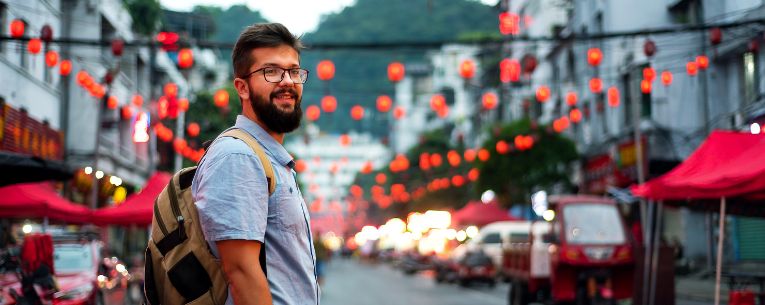Think back on all the trips you’ve taken in your life. Some were relaxing, like that week at the resort in Turks and Caicos. Some were exciting, like the Alaskan cruise when you saw grizzly bears and toured a glacier by helicopter.
But were there any trips that changed you forever? Have you ever returned home with a new sense of yourself and your place in the world?
That’s what transformational travel is all about.
What is transformational travel?
Let’s begin with what it’s not. Transformational travel is not synonymous with wellness travel. Wellness travel (think yoga retreat or holistic spa resort) typically focuses inward, on your own spiritual and/or physical wellbeing. Nor is transformational travel the same thing as sustainable travel, although it does incorporate principles of sustainability.
Rather, transformative travel is a way to journey mindfully, connect with people along the way, and contribute to positive change. The Transformational Travel Council defines it as “intentionally traveling to stretch, learn and grow into new ways of being and engaging with the world.”1
How to fully experience transformational travel
Jaco J. Hamman, professor of religion, psychology, and culture at Vanderbilt Divinity School, outlines the six phases of a transformative travel experience:
- Anticipating: In the weeks and days before your trip, you may feel excited, anxious, impatient, or overwhelmed. Try to go a little deeper, beyond the normal flurry of tasks and emotions. Do you have any preconceived notions about your destination that you need to let go? Try not to assume or expect that your trip will go a certain way. Commit to staying open-minded.
- Leaving: The process of travel may also cause feelings of impatience or anxiety. Practice mindfulness at every stage — it’s all part of the journey (even waiting in line at the airport Cinnabon.) Try these tips for managing travel anxiety or for overcoming your fear of flying.
- Surrendering: More than likely, something will go wrong on your trip. Your flight may be delayed. You could crash your rental car. You may even experience a medical emergency. Instead of railing against the unfairness of it all, Hamman advises surrendering to the circumstances: “The perfectionist learns that a changed itinerary doesn’t mean a diminished travel experience and lets go of their fear of failure. The person with a strong sense of independence grows in vulnerability as they receive care from strangers.” Remember, 24-hour assistance is always there for you.
- Meeting: Honor the people you meet by questioning your ingrained assumptions and practicing cultural humility. This means doing your best to respect local customs, willingly admitting that you don’t always know the right thing to do, and asking for guidance.
- Caring: What are you doing to actively show love for your destination? Stay in a family-owned hotel instead of a corporate resort. Choose sustainable methods of travel. Learn about local economic and environmental injustice and ask what you, as a visitor, can do to address it.
- Returning: Allow your travel experience to soak in and continue to change you. Hamman advises travelers to “share their experiences with others, stay connected to the places they visited, deepen their knowledge about the place and culture, anticipate a possible return trip or get involved in causes that they discovered on their trip.”2
Tips for planning a transformational travel experience
You don’t have to go far. It’s good to leave your comfort zone — but there’s no rule that says you have to travel halfway around the world to do that. You can have a transformative experience in the United States by (just to name a few ideas) stargazing in a Dark Sky Place; following the U.S. Civil Rights Trail; or witnessing a seasonal celebration, dance or feast day of the Tribes, Nations and Pueblos of New Mexico.
Stay flexible. While some companies offer pre-planned trips that promise to be transformational, this isn’t quite the right spirit. Instead of locking yourself into a tour itinerary or secluding yourself at a resort, seek out freeform ways to travel: road tripping, backpacking, volunteering, exploring.
Understand what your travel insurance does and doesn’t cover. Insurance is a must-have for any transformational trip, especially if you’re heading overseas. Fracture your ankle while hiking in the mountains? Travel insurance can help. Find yourself stranded by a storm? Travel insurance can help.
It’s important to understand the exceptions, however. For example, psychedelic retreats are an increasingly popular form of transformational travel. But if something goes wrong, travel insurance does not cover any losses resulting from the use or abuse of drugs (unless prescribed by a doctor and used as prescribed).
Take a break from posting. Showing off carefully staged travel videos or photos is performative, not transformative. Don’t treat people and landscapes as mere objects to record and collect. Find out what happens when you allow yourself to simply be where you are and connect with your surroundings.
Go somewhere with a personal connection. Discovering the land of your ancestors can be a deeply meaningful way to travel. Get advice on planning heritage or ancestry travel.
Embrace challenges. Transformative travel isn’t a smooth glide on a paved road. Venture to places that are off the beaten track, and you’ll be rewarded with authentic, unforgettable experiences.
Related Articles









Share this Page